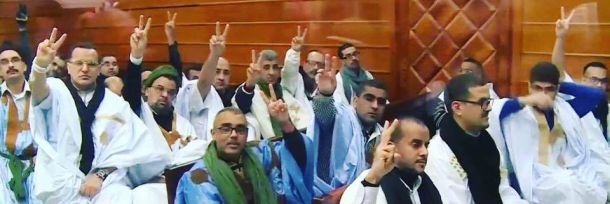The Honourable Ban Ki-moon
United Nations Secretary-General
760 United Nations Plaza
United Nations
New York, NY 10017
November 4, 2010
Your Excellency,
Saharawi in the occupied territory of Western Sahara recently rejected Morocco’s 35-year occupation en masse, moving from cities including El-Aaiún, Smara and Dakhla into nearby encampments. The Saharawi have done so because of dismal social and economic prospects in which they are increasingly disadvantaged and marginalized in their own land. While the Moroccan military tries to seal off the camps, the humanitarian situation of the Saharawi protesters grows ever more troubling. Several violent interventions by the Moroccan security forces have been reported, among which the fatal checkpoint shooting of the 14-year old Saharawi Nayem Elgarhi outside the camp near El-Aaiún. Morocco has denied foreign observers and the international media access to these camps.
The extremely tense situation in occupied Western Sahara illustrates the need for the UN to work for the protection of both the people and the natural wealth of territory. Therefore, Western Sahara Resource Watch (WSRW), an international NGO - with member organisations in over 35 countries - with the aim of safeguarding Western Sahara’s natural resources for the Saharawi people, would like to repeat its call for the establishment of a mechanism to place the proceeds from the exploitation of Western Sahara’s natural resources under international administration until the conflict has been resolved, and for the inclusion of a human rights component into the MINURSO mandate.
Thousands of Saharawi collectively choose to live as exiles in protest camps, to denounce the discrepancy between their socio-economic marginalisation and the wealth of natural resources harboured by their homeland. Meanwhile Morocco continues to illegally exploit those resources, in contravention of a raft of UN General Assembly resolutions including resolutions 62/113, 62/120, 63/102, 63/111, 64/98 and 64/99, amongst others, as well as its international obligations pursuant to Article 1 of both the International Covenant on Civil and Political Rights and the International Covenant on Economic, Social and Cultural Rights. As established with great clarity by the UN Legal Counsel in 2002:
‘…if further exploration and exploitation activities were to proceed in disregard of the wishes and interests of the people of Western Sahara, they would be in violation of the principles of international law applicable to mineral resource activities in Non-Self-Governing Territories.’
All evidence shows that the Saharawi people have not been consulted in relation to the exploitation of Western Sahara’s resources by the Moroccan authorities and complicit foreign interests, and that they do not reap any benefit from the economic undertakings in the territory. The protest camps visibly demonstrate that the two legal prerequisites for economic activities in a Non-Self Governing Territory have not been met: namely consideration of the wishes and interests of the people of that territory. On behalf of the Saharawi people, the Frente POLISARIO has protested these illegal activities in numerous letters to both the Security Council and to your Excellency. It is clear that Morocco’s continuing and illegal exploitation of the natural resources of Western Sahara continues to undermine confidence between the parties and as such is a key obstacle to the resolution of this long-standing dispute.
Western Sahara Resource Watch urges the establishment of a mechanism to place the proceeds from the exploitation of the territory’s natural resources under international administration until the status of the territory has been resolved.
Furthermore, the current situation once again underlines the need for the MINURSO mandate to be adapted to include a human rights monitoring capacity, with a direct reporting line to the UN Security Council. The UN has an obligation to protect the Saharawi population while they wait for the organisation of a just and equitable self-determination referendum, in conformity with the resolutions of the UN General Assembly, the UN Security Council and of the African Union. MINURSO is the only UN mission established since 1978 without a mandate to monitor human rights. The tragic death of a 14-year old Saharawi boy renders this unjustifiable.
Yours sincerely,
Sara Eyckmans
International Coordinator
Western Sahara Resource Watch
Life sentences confirmed for political prisoners
The Moroccan Court of Cassation yesterday confirmed the harsh sentences rendered against the so-called Gdeim Izik prisoners. The group took part in the mass protest on socio-economic marginalisation in Western Sahara in 2010.
Soon 10 years of wrongful imprisonment: release Gdeim Izik group now
Western Sahara Resource Watch calls for immediate and unconditional release of the group of leading Saharawi activists who were arrested in 2010 for advocating for socio-economic rights of the Saharawi people.
South Africa stands up against the plunder of Western Sahara
The Government of South African today issued a strong statement of support for International Humanitarian Law in Western Sahara during a meeting in Geneva today.
Civilian court follows military court against Saharawi activists
Verdict comes after years of accusations that the trials were politically motivated, imprisoning activists who stood up against Morocco's social and economic deprivation of Saharawis.



